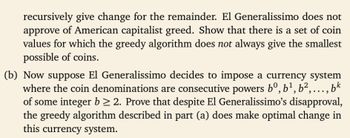
Database System Concepts
7th Edition
ISBN: 9780078022159
Author: Abraham Silberschatz Professor, Henry F. Korth, S. Sudarshan
Publisher: McGraw-Hill Education
expand_more
expand_more
format_list_bulleted
Question
I only need part B in the image, I have already completed part A. How do I formally prove that by using consecutive powers for the values of coins, that it will give me the optimal solution? (using induction preferably unless an easier formal proof is available)
![14. Suppose you are a simple shopkeeper living in a country with n different
types of coins, with values 1 = c[1] < c[2] < <c[n]. (In the U.S.,
for example, n = 6 and the values are 1, 5, 10, 25, 50 and 100 cents.)
Your beloved and benevolent dictator, El Generalissimo, has decreed that
whenever you give a customer change, you must use the smallest possible
number of coins, so as not to wear out the image of El Generalissimo lovingly
engraved on each coin by servants of the Royal Treasury.
(a) In the United States, there is a simple greedy algorithm that always
results in the smallest number of coins: subtract the largest coin and](https://content.bartleby.com/qna-images/question/b4166fb6-6929-41f4-8487-1a34268c5900/efeda0e1-a48e-49bf-9b11-914ef231dad3/7v2h0f_thumbnail.jpeg)
Transcribed Image Text:14. Suppose you are a simple shopkeeper living in a country with n different
types of coins, with values 1 = c[1] < c[2] < <c[n]. (In the U.S.,
for example, n = 6 and the values are 1, 5, 10, 25, 50 and 100 cents.)
Your beloved and benevolent dictator, El Generalissimo, has decreed that
whenever you give a customer change, you must use the smallest possible
number of coins, so as not to wear out the image of El Generalissimo lovingly
engraved on each coin by servants of the Royal Treasury.
(a) In the United States, there is a simple greedy algorithm that always
results in the smallest number of coins: subtract the largest coin and

Transcribed Image Text:recursively give change for the remainder. El Generalissimo does not
approve of American capitalist greed. Show that there is a set of coin
values for which the greedy algorithm does not always give the smallest
possible of coins.
(b) Now suppose El Generalissimo decides to impose a currency system
where the coin denominations are consecutive powers bº, b¹,b²,..., bk
of some integer b≥ 2. Prove that despite El Generalissimo's disapproval,
the greedy algorithm described in part (a) does make optimal change in
this currency system.
Expert Solution
This question has been solved!
Explore an expertly crafted, step-by-step solution for a thorough understanding of key concepts.
This is a popular solution
Trending nowThis is a popular solution!
Step by stepSolved in 2 steps

Knowledge Booster
Learn more about
Need a deep-dive on the concept behind this application? Look no further. Learn more about this topic, computer-science and related others by exploring similar questions and additional content below.Similar questions
- We mentioned that if we want to prove P ≠ NP, we only need to pick up any one NPC problem and prove that polynomial-time algorithm does not exist for the problem. If you want to prove P ≠ NP, select one NPC problem based on your preference and describe your idea of why polynomial-time algorithm does not exist for the problem. It does not have to be a formal proof, a description of your idea would be fine.arrow_forwardHow can we solve a and b using direct proof?arrow_forwardJustify (argue, prove, ...) that the following formula is valid Vx A(x) V Vx B(x) → Vx (A(x) V B(x))arrow_forward
- Calculate the optimal value of the decision parameter p in the Bresenham's circle drawing algorithm. The stepwise procedure for implementing Bresenham's algorithm for circle drawing is delineated.arrow_forwardPLEASE answer ASAP, thanks Using the greedy approach i will give likes if you answer as soon as possiblearrow_forwardprove the following using an equational style proof if x does not occur free in Aarrow_forward
arrow_back_ios
arrow_forward_ios
Recommended textbooks for you
 Database System ConceptsComputer ScienceISBN:9780078022159Author:Abraham Silberschatz Professor, Henry F. Korth, S. SudarshanPublisher:McGraw-Hill Education
Database System ConceptsComputer ScienceISBN:9780078022159Author:Abraham Silberschatz Professor, Henry F. Korth, S. SudarshanPublisher:McGraw-Hill Education Starting Out with Python (4th Edition)Computer ScienceISBN:9780134444321Author:Tony GaddisPublisher:PEARSON
Starting Out with Python (4th Edition)Computer ScienceISBN:9780134444321Author:Tony GaddisPublisher:PEARSON Digital Fundamentals (11th Edition)Computer ScienceISBN:9780132737968Author:Thomas L. FloydPublisher:PEARSON
Digital Fundamentals (11th Edition)Computer ScienceISBN:9780132737968Author:Thomas L. FloydPublisher:PEARSON C How to Program (8th Edition)Computer ScienceISBN:9780133976892Author:Paul J. Deitel, Harvey DeitelPublisher:PEARSON
C How to Program (8th Edition)Computer ScienceISBN:9780133976892Author:Paul J. Deitel, Harvey DeitelPublisher:PEARSON Database Systems: Design, Implementation, & Manag...Computer ScienceISBN:9781337627900Author:Carlos Coronel, Steven MorrisPublisher:Cengage Learning
Database Systems: Design, Implementation, & Manag...Computer ScienceISBN:9781337627900Author:Carlos Coronel, Steven MorrisPublisher:Cengage Learning Programmable Logic ControllersComputer ScienceISBN:9780073373843Author:Frank D. PetruzellaPublisher:McGraw-Hill Education
Programmable Logic ControllersComputer ScienceISBN:9780073373843Author:Frank D. PetruzellaPublisher:McGraw-Hill Education

Database System Concepts
Computer Science
ISBN:9780078022159
Author:Abraham Silberschatz Professor, Henry F. Korth, S. Sudarshan
Publisher:McGraw-Hill Education

Starting Out with Python (4th Edition)
Computer Science
ISBN:9780134444321
Author:Tony Gaddis
Publisher:PEARSON

Digital Fundamentals (11th Edition)
Computer Science
ISBN:9780132737968
Author:Thomas L. Floyd
Publisher:PEARSON

C How to Program (8th Edition)
Computer Science
ISBN:9780133976892
Author:Paul J. Deitel, Harvey Deitel
Publisher:PEARSON

Database Systems: Design, Implementation, & Manag...
Computer Science
ISBN:9781337627900
Author:Carlos Coronel, Steven Morris
Publisher:Cengage Learning

Programmable Logic Controllers
Computer Science
ISBN:9780073373843
Author:Frank D. Petruzella
Publisher:McGraw-Hill Education